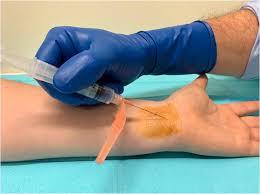Carpal tunnel syndrome (CTS) is a common condition caused by pressure on the median nerve in the wrist, leading to pain, numbness, and tingling in the hand and fingers. For those experiencing persistent symptoms, carpal tunnel injections offer an effective non-surgical treatment option to reduce inflammation and relieve discomfort. This article explores what carpal tunnel injections are, how they work, the procedure, costs, and what patients can expect.
Understanding Carpal Tunnel Syndrome
Carpal tunnel syndrome occurs when the median nerve, which runs from the forearm into the palm, becomes compressed at the wrist. This can result from repetitive hand movements, wrist injuries, arthritis, diabetes, or fluid retention during pregnancy. Common symptoms include:
-
Numbness or tingling in the thumb, index, and middle fingers
-
Weakness in the hand
-
Pain or discomfort that worsens at night
-
Difficulty gripping objects
While mild cases can improve with rest, splints, and lifestyle changes, persistent symptoms often require medical intervention.
What Are Carpal Tunnel Injections?
Carpal tunnel injections are a minimally invasive treatment in which a corticosteroid (anti-inflammatory medication) is injected into the carpal tunnel of the wrist. The goal is to reduce swelling and relieve pressure on the median nerve, providing symptom relief.
-
Medication Used: Typically corticosteroids such as triamcinolone or methylprednisolone, sometimes combined with local anesthetics.
-
Purpose: Reduce inflammation, decrease pain, improve hand function.
-
Duration of Relief: Relief can last from weeks to months, though repeated injections may be necessary.
Who Should Consider Carpal Tunnel Injections?
Injections are generally recommended for patients who:
-
Experience moderate symptoms unresponsive to wrist splints or rest
-
Have intermittent numbness or tingling affecting daily activities
-
Prefer to avoid immediate surgery
-
Have contraindications for surgical intervention
Your healthcare provider will assess your symptoms, conduct physical tests, and possibly recommend nerve conduction studies to confirm CTS before recommending injections.
The Injection Procedure
Carpal tunnel injections are quick, typically completed in 5–10 minutes, and performed in a clinic or outpatient setting. The steps usually include:
Preparation: The skin over the wrist is cleaned and sterilized.
Anesthesia: A local anesthetic may be applied to minimize discomfort.
Injection: Using a fine needle, the corticosteroid is carefully injected into the carpal tunnel space.
Post-Injection Care: The wrist may be lightly bandaged, and patients are advised to limit heavy activity for 24–48 hours.
The procedure is generally well-tolerated, with most patients experiencing mild discomfort at the injection site.
Benefits of Carpal Tunnel Injections
-
Rapid relief of pain, tingling, and numbness
-
Non-surgical, minimally invasive treatment
-
Short recovery time
-
Can delay or prevent the need for surgery
Risks and Considerations
While carpal tunnel injections are generally safe, potential risks include:
-
Temporary soreness or bruising at the injection site
-
Infection (rare)
-
Temporary flare of symptoms
-
Nerve injury (very rare)
-
Skin discoloration or thinning at the injection site
Patients with diabetes should be aware that corticosteroids may temporarily raise blood sugar levels.
Aftercare and Recovery
After receiving a carpal tunnel injection:
-
Avoid strenuous wrist activity for at least 24 hours
-
Apply ice if mild swelling or discomfort occurs
-
Monitor for signs of infection (redness, warmth, swelling)
-
Follow up with your healthcare provider to assess symptom improvement
Most patients notice symptom relief within a few days, though full effects may take 1–2 weeks. Repeated injections are sometimes necessary for lasting relief.
Alternatives to Injections
If injections are not effective or symptoms persist, other treatment options include:
-
Wrist Splints: Helps keep the wrist in a neutral position, especially during sleep
-
Physical Therapy: Exercises to strengthen the wrist and hand
-
Surgery: Carpal tunnel release surgery may be considered for severe or persistent cases
Injections are often a first-line intervention for moderate CTS before considering surgical options.
Cost of Carpal Tunnel Injections
The price of carpal tunnel injections varies depending on location, clinic, and whether it is covered by insurance. Typical costs in the UK range from £100–£300 per injection. Multiple injections may be required for lasting relief.
Insurance coverage may apply if injections are deemed medically necessary. Always confirm costs with your healthcare provider or insurance plan.
Conclusion
Carpal tunnel injections provide a safe, effective, and minimally invasive solution for relieving the pain and discomfort of carpal tunnel syndrome. By reducing inflammation and pressure on the median nerve, injections help restore hand function and improve quality of life.
Patients should consult a qualified healthcare professional to determine if injections are appropriate for their symptoms. With proper care, injections can offer lasting relief and delay or even prevent the need for surgery, making them a valuable treatment option for carpal tunnel syndrome.



